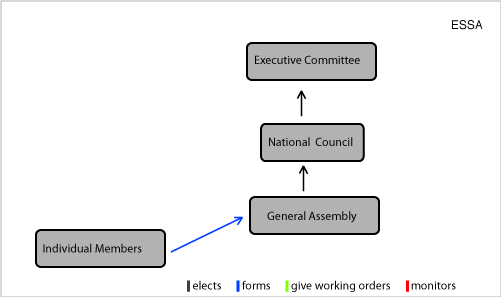url: http://www.edufile.info/index.php?view=representations&topic=topic_general_infos&country=3&add_tag=-47
Representations England
Name
English Secondary Students' Association - ESSA
Type of Members
Individual students and schools.
Individual membership is free. Affiliated school membership package cost £75 and every student within that school becomes an affiliated member.
Amount of members
[missing data]
General Assembly
ESSA is unable to run a GA because of issues regarding logistics and funding. It is ESSA's aim to establish GA in near future, however.
Budget
[missing data]
Organisation's Staff
3 full-time (Student Support Officer, Black and Minority Ethnic Coordinator, Project Manager)
Year of Foundation
2005
Basic Structure

The ‘head’ of ESSA is a National Council of elected students from the 9 government regions. The Council meets four times a year and makes decisions about ESSA policy, as well as representing ESSA at conferences, representing ESSA within the media and promoting ESSA’s cause. The Council is supported by the Executive Committee, which affects the decisions of the Council and provides general support. The Executive Committee is currently staffed entirely by Gap Year students, and will continue to be formed from ‘young people’ (as with all ESSA’s staff). The General Assembly is, as mentioned, not a yet a reality.
Other Student Unions
[missing data]
Student Representations
Section 176 of Education Act of 2002 states that students should have their voice heard. This works in conjunction with the UN Convention on the Rights of the Child, Article 12. However, beyond this there is little except guidelines. Student Voice is too frequently considered synonymous with a school council, and these are widespread. However, they are frequently badly run and ineffective. There are a number of other examples of student voice, but they are not consistently employed. These include: student governors, students on interview panels, specific research groups of students, peer-mentoring and counselling schemes and student-led campaigns.
Students at School Level
Students are sometimes (rather haphazardly) consulted by the Government on various issues, and are included by some schools in the writing of their development plans. This is inconsistent, however.
Students in Municipal or Governmental Bodies
[missing data]
Success
As the examples above show, Student Voice varies significantly in different schools and different areas. Generally, students tend to be given a voice on less important issues, and Student Voice is too often a privilege rather than a right. There are significant problems, however, for any body that truly wishes to effectively consult with students, as the mechanisms for this are not in place. It is hoped that ESSA will fulfil this requirement in the future.
Hurdles
[missing data]
Issues
[missing data]


